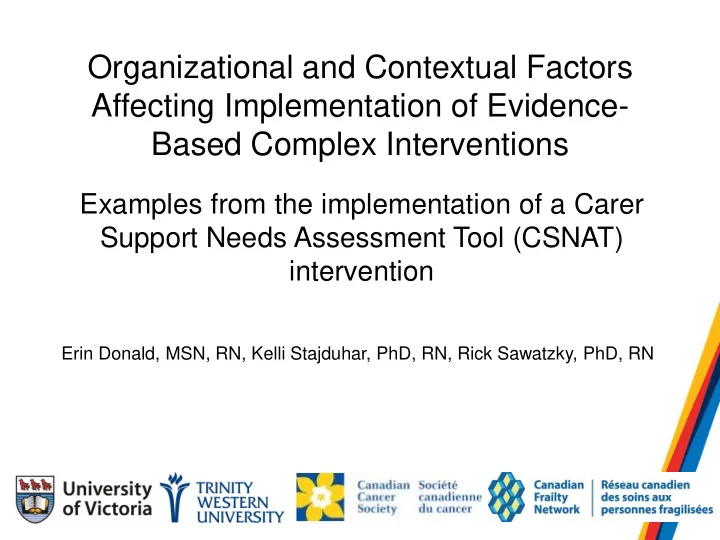

Organizational and Contextual Factors Affecting Implementation of Evidence- Based Complex Interventions Examples from the implementation of a Carer Support Needs Assessment Tool (CSNAT) intervention Erin Donald, MSN, RN, Kelli Stajduhar, PhD, RN, Rick Sawatzky, PhD, RN
From maps.google.com
Quantitative Methods Overview Clustered, Randomized Control Trial Recruit HCNs Randomization of HCNs Intervention Control HCN HCN Cluster Cluster Recruitment Recruitment HCN HCN Begins Recruits Recruits Ends (0 months) FCGs FCGs (18 months) CRA gets CRA gets Data Data consent consent Collection and and Collection Begins begins begins Ends (2 weeks) with with (24 months) baseline baseline CSNAT will be completed with FCG by HCNs every 4 weeks (+/- 1 wk) until patient death or study ends. Questionnaires are done by CRA with the FCG every 4 weeks (+/- 1 wk) until patient death or study ends. Final Questionnaire is done 12 weeks (+/- 1 wk) into bereavement. 3
Qualitative Data Goals • The current state of home care on Vancouver Island • Challenges to participating in a study like this one • Challenges/barriers that make recruitment difficult
Focus Groups and Interviews • Home care nurses (29), key informants (9) • 6 focus groups, 21 interviews • HCNs avg. 22 years experience in nursing (1.5-42, med. 26) • HCNs avg. 12 years experience in home care (1.5-39 years, med. 10) • Avg. 6 years in current office • Mostly part-time
Findings • System • Organizational • Nursing
System Issues • Increasing complexity • Increased volume of home care patients • Late admissions
``I find that the doctors often will have a palliative client but they won’t phone to register them with nursing until there’s a nursing need… ` so often we’ll say, “Well, I wish you would have called us a long time ago.” You know, so that we can establish a relationship and kind of anticipate needs... So then you’re going in there with guns blazing and, you know, you’re hardly doing this relational thing, you’re more treating symptoms and doing tasks and then, to pull out this questionnaire, is not the time.`` (3 Dec P2)
Organizational Issues • Continuity of care • Organizational changes • Reduced visits, visit times
“…sometimes that tool can get you into a whole other conversation. It’s almost like having two visits…It’s very good for them and it’s good for practice but the model that we’re working under is not going in that direction. The model that we’re going into is, “Cut your visit short, use as little resources as you can, get in and out and see as many people as you can in a day… and it’s encouraged to do a phone call visit versus a home visit.” (3 Dec 2015 P2)
Nurses • Are engaged • Feeling guilty
“It’s more the guilty feeling of, “Maybe I shouldn’t be doing this study because I haven’t recruited anybody. So, but then, you know, you get the email, haven’t had any recruitment then you say, “Okay, I’m going to try really hard.” But then you try, and then people decline, whatever, but you keep trying. But that constant guilty feeling, you know, you think, “Okay, I’ve got to keep trying here,” (3 Dec 2015 P)
Nurses Recruiting • Finding the right window
Nurses • Who are they recruiting? – FCGs who are present and engaged – Experiencing burden, but not overwhelmed
“…you know, protecting their [caregivers’] time and space and you know, I don’t know. I do remember introducing some studies to people. But not to everybody…yeah. I’m sure I did the same thing. You know? “I don’t think this family could handle one more thing on their plate.” (KI 12 Jan 2016)
Nurses • When are they recruiting? – Relationship is established – Not in crisis
“…just finding it appropriate to ask, because there is so much information that we are giving. Not so much if I’m sure they will say yes or no to the question but finding one more thing - is it appropriate to ask at that time. Then, sometimes, it feels like, okay I forgot to ask, so do we go back to ask now after 4 or 5 visits? It is just that consistency again… I might not be in for 2 or 3 more weeks and that doesn’t seem quite to fit in place.” (10 Dec 2015 P )
Nurses • Prioritizing • Remembering • Work flow
“it is that little extra thing that adds to the work related to that patient and when it is very intensive at the end like that it might be at the bottom of the check list” (15 Dec 2015 P) “it’s just to have it in your thoughts when you’re sort of just scrambling, you know, to get through your day, and yeah, to take that time. And really, it doesn’t take that much time, but I think to make time in your brain for it.” (9 Dec 2015 I P1)
Conclusion Erin E. Donald, MSN, RN donalde@uvic.ca
Recommend
More recommend